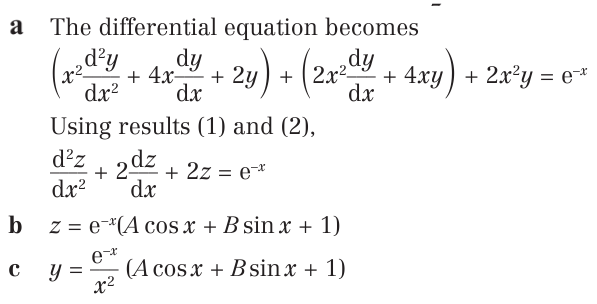Reduce a 2nd-order ODE using substitution 2
Resources on this page:
Generated* SBD with worked solution
*Refresh this page to get a new variation.

Further Pure 1 Ex 9B Q3 - the answer is at the bottom of this page
Remember: productive practice is perfect preparation
- Once you have seen and understood how to do the question then do it yourself
- If you used help then after a few days retry the question without help
FP1 Ex 9B Q3 - Generated SBD
\(
\newcommand\cosec{{ \,\text{cosec}\, }}
\newcommand\fderiv{{ \frac{\text{d}}{\text{d}x} }}
\newcommand\fderivy{{ \frac{\text{d}y}{\text{d}x} }}
\newcommand\fderivz{{ \frac{\text{d}z}{\text{d}x} }}
\newcommand\sderiv{{ \frac{\text{d}^2}{\text{d}x^2} }}
\newcommand\sderivy{{ \frac{\text{d}^2y}{\text{d}x^2} }}
\newcommand\sderivz{{ \frac{\text{d}^2z}{\text{d}x^2} }}
\)
(a) Show that the transformation \( y = \)
\({z \over x^2} \)
transforms the differential equation
\[
x^2 \sderivy + @03 x(@04 @05 x) \fderivy + @06(@07 x^2 @08 x + @09)y = \text{e}^{@02 x} \qquad ...(1)
\]
into the differential equation
\[
\sderivz @00 \fderivz + @01 z = \text{e}^{@02 x} \qquad ...(2)
\]
(6 marks)
(b) Find the general solution to the differential equation (2), giving \(z\) as a function of \(x\).
(7 marks)
(c) Hence obtain the general solution to differential equation (1).
(1 mark)
Solution
\[\begin{align}
&\text{(a) First we need to find the first and second derivatives of the given transformation:}
\\\\
& z = x^2 y \qquad ...(3)
\\\\
& \fderivz = 2xy + x^2 \fderivy \qquad \implies \qquad x^2 \fderivy = \fderivz - 2xy \qquad ...(4)
\\\\
& \sderivz = 2y + 4x \fderivy + x^2 \sderivy \qquad \implies \qquad x^2 \sderivy = \sderivz - 4x \fderivy - 2y \qquad ...(5)
\\\\
&\text{Substitute (5) in (1)}.
\\\\
& \left( \sderivz - 4x \fderivy - 2y \right) + @03 x(@04 @05 x) \fderivy + @06(@07 x^2 @08 x + @09)y = \text{e}^{@02 x}
\\\\
&\text{Collect terms:}
\\\\
& \sderivz @00 x^2 \fderivy + @06(@07 x^2 @08 x)y = \text{e}^{@02 x}
\\\\
&\text{Substitute for $x^2 \fderivy$ using (4):}
\\\\
& \sderivz @00 \left( \fderivz - 2xy \right) + @06(@07 x^2 @08 x)y = \text{e}^{@02 x}
\\\\
&\text{Collecting terms again:}
\\\\
& \sderivz @00 \fderivz + @01 x^2 y = \text{e}^{@02 x}
\\\\
&\text{Substitute for $x^2y$ using (3):}
\\\\
& \sderivz @00 \fderivz + @01 z = \text{e}^{@02 x} \qquad \text{as required.}
\\\\
\\\\
&\text{(b) Write down the complementary function:}
\\\\
& t^2 @00 t + @01 = 0
\\\\
&\text{Use the quadratic formula:}.
\\\\
& t = \frac{@10 \pm \sqrt{@11^2 - 4 \times 1 \times @01}}{2 \times 1}
\\\\
&\text{This gives us complex roots:}
\\\\
& t = @12 \pm @13 i
\\\\
&\text{So the particular solution is:}
\\\\
& z = \text{e}^{@14x} (A \cos @13 x + B \sin @13 x)
\\\\
&\text{We want the general solution, so try $\lambda\text{e}^{@02 x}$ for $z$ in (2):}
\\\\
& \sderiv (\lambda\text{e}^{@02 x}) @00 \fderivz (\lambda\text{e}^{@02 x}) + @01 (\lambda\text{e}^{@02 x}) = \text{e}^{@02 x}
\\\\
& @15\lambda\text{e}^{@02 x} @16\lambda\text{e}^{@02 x} + @01\lambda\text{e}^{@02 x} = \text{e}^{@02 x}
\\\\
&\text{So we have} \quad \lambda = @17
\\\\
&\text{This gives us the general solution:}
\\\\
& z = \text{e}^{@14x} (A \cos @13 x + B \sin @13 x @18) @19
\\\\
\\\\
&\text{(c) Substitute for $z$ using (3):}
\\\\
& y = {\text{e}^{@14x} \over x^2} (A \cos @13 x + B \sin @13 x @18) @20
\end{align}\]

Answer to the textbook question at the top of this page

 Armul Mathematics & Computing
Armul Mathematics & Computing




